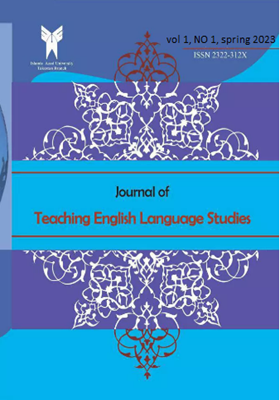Elicitative Psycholinguistic Tasks for EFL/ESL Research: A Literature Review
محورهای موضوعی : Journal of Teaching English Language Studies
1 - Department of Language Teaching and Translation Studies, Rahman Institute for Higher Education, Ramsar, Iran.
کلید واژه: Psycholinguistics, TBLT, elicitation, SLA Methodology,
چکیده مقاله :
Research in the fields of applied linguistics including language teaching and translation studies has for long been controversial at least in terms of methodology and instrumentation in particular. For instance, Gass & Mackey (2000-2009) elaborated on stimulated recall methodology, or Ellis & Barkhuizen (2005) discussed their instrumentations and methodologies for analyzing learners’ language. The impetus of the current report came from their focus on the methods and instruments in SLA research plus the tasks mentioned in Komatsu (1994) collection of research studies in cognitive psychology. Attempts were made in this article to present a list of applicable psycholinguistic tasks used in SLA. Each task underwent elaboration, and was clarified by mentioning at least one study in which the task had been used. The result of this review may have two benefits: first, many of such tasks are still practical i.e. they can still be used by researchers in linguistic and psycholinguistic fields. Second, the list of psycholinguistic tasks gives a sort of familiarity to those readers or researchers who may be at their beginning way of making their studies and conducting their experiments.
Baddeley, A. D. & Lieberman, K. (1980). Spatial working memory. In R. S. Nickerson (ed.), Attention and performance VIII (S.521-539). Hillsdale, NJ: Lawrence Erlbaum.
Donders (1868). Cognition and Affect edited by J.S. Antrobus 1969).
Ellis, R. (2003). Task-based Language Learning and Teaching. Oxford, New York: Oxford Applied Linguistics. ISBN 978-0-19-442159-1.
Ellis, A.W., Miller, D., & Sin, G. (1983). Wernicke's aphasia and normal language processing: A case study in cognitive neuropsychology. Cognition, 15, 1983, pp. 111-114).
Graf, P., Shimamura, A., Arthur, P. & Squire, L.R. (1985). Priming across modalities and priming across category levels: Extending the domain of preserved function in amnesia. Journal of Experimental Psychology, Learning, Memory and Cognition, 11(2), 1985, pp. 386-396).
Komatsu, L.K. (1994) Experimenting with the Mind: Readings in Cognitive Psychology.. Wadsworth, Inc.
Levy, B. A. (1971). Role of articulation in auditory and visual short-term memory. Journal of Verbal Learning and Verbal Behavior, 10, 123–132.
Long, Michael, H. (1985). "A Role for Instruction in Second Language Acquisition: Task- based Language Teaching". Modelling and Assessing Second Language Acquisition.
Murray, D. J. (1968). Articulation and acoustic confusability in short-term memory. Journal of Experimental Psychology, 78, 679–684.
Nunan, D. (2004). Task-based Language Teaching. New York: Cambridge University Press. pp. 1–16. ISBN 978-0-521-84017-0.
Prabhu, N. S. (1987). Second Language Pedagogy. Oxford University Press. Retrieved 18 January 2013.
Rosch, E., & Mervis, C.B. (1975). Family Resemblances: Studies in the Internal Structure of Categories. Cognitive Psychology, 7 (4), 1975, pp. 573-605.
Rundus, D., & Atkinson, R. C. (1970). Rehearsal processes .in free recall: A procedure for direct observation. Journal of Verbal Learning and Verbal Behavior, 1970, 9, 99-105.
Treisman, A.M. (1960). Contextual Clues in Selective Listening. Quarterly Journal of Experimental Psychology, 12, 1960, pp. 242-284.
Wason, P.C. & Shapiro, D. (1971). Natural and Contrived Experience in a Reasoning Problem. Quarterly Journal of Experimental Psychology, 23, 1971, pp. 63-71.
White, L. (1989). Universal Grammar & Second Language Acquisition. McGil University.


